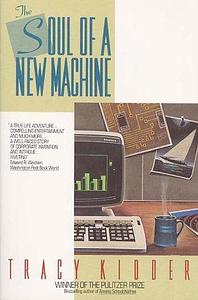You need to sign in or sign up before continuing.
Take a photo of a barcode or cover
adventurous
emotional
informative
inspiring
reflective
medium-paced
I remember reading this book back in the very early 1980s just as I was starting my already fated computer career. Man, I totally wanted to be these guys. When I read it I didn't know how recent a book it was since the Eclipse they described was circa 1980 and it already seemed dated but that's the computer business. The writing is tight and you really get a feel of what it's like to be "in the pipeline" of a product launch. It wasn't until working at NeXT that I really appreciated how much this book captured that.
informative
reflective
tense
fast-paced
Well written and fairly interesting. I'm a techie, but probably too young to relate to or fully appreciate the culture described in the book. The show "Halt and Catch Fire" in my opinion does a better job of conveying this, which probably comes down to the medium (and of course I appreciate that this book had a major influence on the show).
A Robert Caro like discerption of how a team of renegade engineers brought a new computer to the market.
It was sheer machoism, and perhaps the computer industry was much worse in the infancy.
Too long to be a book, though could have been a nice article.
It was sheer machoism, and perhaps the computer industry was much worse in the infancy.
Too long to be a book, though could have been a nice article.
informative
inspiring
reflective
This book won the Pulitzer Prize in 1982, which given the subject matter is really fairly remarkable.
I first read this book almost 40 years ago. It was required reading when I worked at a company called Convex Computer. Several of the people mentioned in this book came over, and some helped found Convex (as well as several from the competing company mentioned in this book, Digital Equipment). I am not sure if the book was supposed to be motivational, or a warning as to what I was signing up for.
Reading it again (it is now classified as “Historical Computing” on Amazon, ouch!), brought back a lot of memories of working on a project like that. The author really captured the intensity, excitement, and outright terror of working on a high-stakes project on the lunatic fringe of what was possible at the time.
The first time I read it I was focused on the technology aspects of the project and who were these people that I was working with.
This time I saw the bigger picture. This book is a great book addressing team dynamics, corporate politics, human behavior, motivation, and management styles.
For Tracy Kidder to get so in with this team to be able to write this book is still amazing to me.
I first read this book almost 40 years ago. It was required reading when I worked at a company called Convex Computer. Several of the people mentioned in this book came over, and some helped found Convex (as well as several from the competing company mentioned in this book, Digital Equipment). I am not sure if the book was supposed to be motivational, or a warning as to what I was signing up for.
Reading it again (it is now classified as “Historical Computing” on Amazon, ouch!), brought back a lot of memories of working on a project like that. The author really captured the intensity, excitement, and outright terror of working on a high-stakes project on the lunatic fringe of what was possible at the time.
The first time I read it I was focused on the technology aspects of the project and who were these people that I was working with.
This time I saw the bigger picture. This book is a great book addressing team dynamics, corporate politics, human behavior, motivation, and management styles.
For Tracy Kidder to get so in with this team to be able to write this book is still amazing to me.
The last email for the day is sent. There are no more calls tonight. And you settle in, warming your bones beside the proverbial fire. Music now fills the room.
The thrill is gone
The thrill is gone away
As you take comfort in the king of blues, you reflect on your work, once your passion.
After many years as a software engineer, one day you find that have ended up with a 'job'. Its hard to pin point when the fun went out of building things. If you find yourself agreeing to BB King, it would be a good time to pick up this book.
Tracy Kidder takes you along on the fascinating journey of this team of engineers as they build The Eagle at Data General. The scene is familiar. An aggressive and brash company - a bastard in the world of IBMs. A young team set up with an impossible deadline, and oh did someone mention the survival of the company depends on the team delivering on time.
The book is more that long hours and the sweat and grit. Kidder introduces you to the engineers, each unique in their on way and also so familair to someone you know from work. The book anchors around Tom West, the man of conviction, man of action. He's the phantom, the jesus reincarnated as bobcat. Nobody knows what he does, but at the end, when you look back you see his magic. The glue that binds all of it together.
"Not everything worth doing is worth doing well", says West. Of late, I am convinced that to build a great product, more than skill you need conviction that you can build a great project.
Data General is a place where Mushroom Management is thriving (keep them in the dark, feed them bullshit). But you encounter some very real people in this book. You encounter the passion, the reason why builders build! I loved this book for that.
"Look, I don't have to get official recognition for anything I do. Ninety-eight percent of the thrill comes from knowing that the thing you designed works, and works almost the way you expected it would. If that happens, part of you is in that machine."
At the end, it all comes down to a game of Pinball, says West. You win, you get to play again. You ship, you get to build again. That is what the people are in for. Thats the reason why we build. There are no morals, you take away what you want to. (There is plenty of wisdom though).
I cant believe the book is as old as me. The team, the suitation, the people are still relevant. If you replace MUD with Quake2, this book could pass off for my generation. Maybe it can pass of the current generation too.
The book took me down the memory lane, the good old days when coding was fun. When you lived by the motto "I did it for the kicks". Maybe its the nostalgia speaking, but everything looks better in old photographs. The book has been a great reminder for me, holding a mirror and asking "are you having fun?"
PS: This year 2000 article O, Engineers! that tracks down the engineers after 18 years of the Soul makes a fascinating after-read.
The thrill is gone
The thrill is gone away
As you take comfort in the king of blues, you reflect on your work, once your passion.
After many years as a software engineer, one day you find that have ended up with a 'job'. Its hard to pin point when the fun went out of building things. If you find yourself agreeing to BB King, it would be a good time to pick up this book.
Tracy Kidder takes you along on the fascinating journey of this team of engineers as they build The Eagle at Data General. The scene is familiar. An aggressive and brash company - a bastard in the world of IBMs. A young team set up with an impossible deadline, and oh did someone mention the survival of the company depends on the team delivering on time.
The book is more that long hours and the sweat and grit. Kidder introduces you to the engineers, each unique in their on way and also so familair to someone you know from work. The book anchors around Tom West, the man of conviction, man of action. He's the phantom, the jesus reincarnated as bobcat. Nobody knows what he does, but at the end, when you look back you see his magic. The glue that binds all of it together.
"Not everything worth doing is worth doing well", says West. Of late, I am convinced that to build a great product, more than skill you need conviction that you can build a great project.
Data General is a place where Mushroom Management is thriving (keep them in the dark, feed them bullshit). But you encounter some very real people in this book. You encounter the passion, the reason why builders build! I loved this book for that.
"Look, I don't have to get official recognition for anything I do. Ninety-eight percent of the thrill comes from knowing that the thing you designed works, and works almost the way you expected it would. If that happens, part of you is in that machine."
At the end, it all comes down to a game of Pinball, says West. You win, you get to play again. You ship, you get to build again. That is what the people are in for. Thats the reason why we build. There are no morals, you take away what you want to. (There is plenty of wisdom though).
I cant believe the book is as old as me. The team, the suitation, the people are still relevant. If you replace MUD with Quake2, this book could pass off for my generation. Maybe it can pass of the current generation too.
The book took me down the memory lane, the good old days when coding was fun. When you lived by the motto "I did it for the kicks". Maybe its the nostalgia speaking, but everything looks better in old photographs. The book has been a great reminder for me, holding a mirror and asking "are you having fun?"
PS: This year 2000 article O, Engineers! that tracks down the engineers after 18 years of the Soul makes a fascinating after-read.
Terrific look at a piece of computer history written at the time it was actually happening. I'd just read Tracey Kidder's book about writing and as a fan of computer history thought this would be a good read. It was as a team puts together Data Generals first 32 bit minicomputer. I'd recommend this book to anyone that enjoys computer history. Well written and fast paced.



